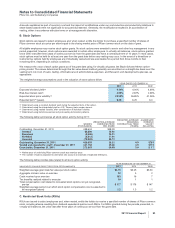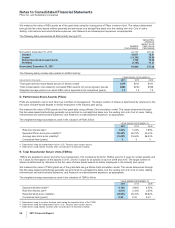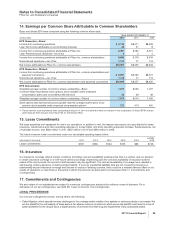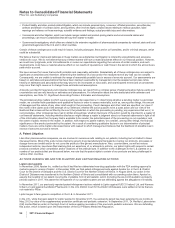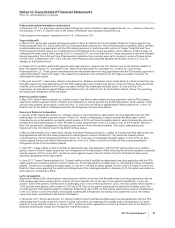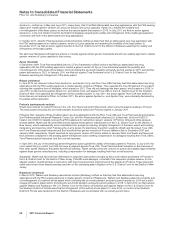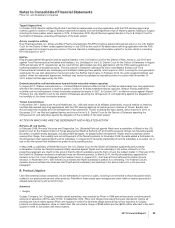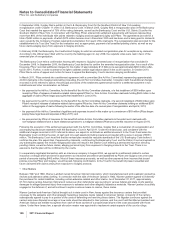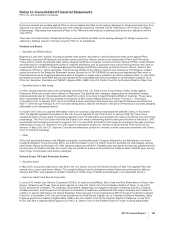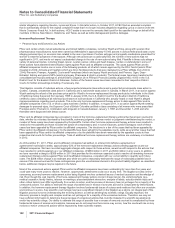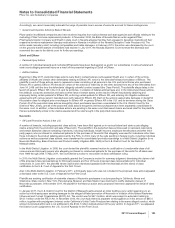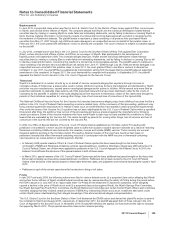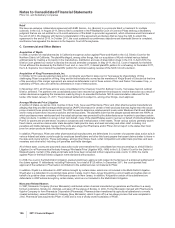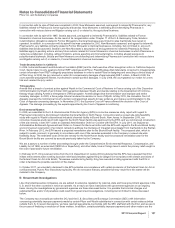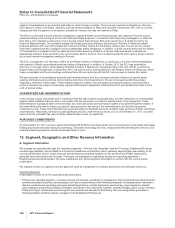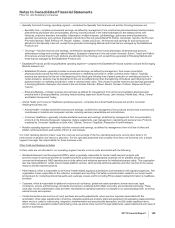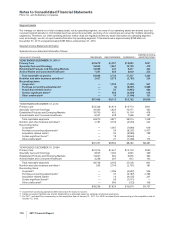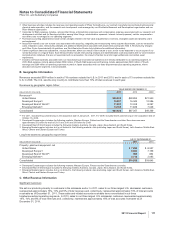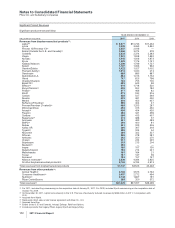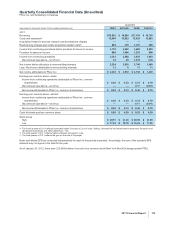Pfizer 2011 Annual Report Download - page 104
Download and view the complete annual report
Please find page 104 of the 2011 Pfizer annual report below. You can navigate through the pages in the report by either clicking on the pages listed below, or by using the keyword search tool below to find specific information within the annual report.
Notes to Consolidated Financial Statements
Pfizer Inc. and Subsidiary Companies
Accordingly, we cannot reasonably estimate the range of possible loss in excess of amounts accrued for these contingencies.
•Government Inquiries; Action by State of Nevada
Pfizer and/or its affiliated companies also have received inquiries from various federal and state agencies and officials relating to the
marketing of their hormone-replacement products. In November 2008, the State of Nevada filed an action against Pfizer,
Pharmacia & Upjohn Company and Wyeth in state court in Nevada alleging that they had engaged in deceptive marketing of their
respective hormone-replacement therapy medications in Nevada in violation of the Nevada Deceptive Trade Practices Act. The
action seeks monetary relief, including civil penalties and treble damages. In February 2010, the action was dismissed by the court
on the grounds that the statute of limitations had expired. In July 2011, the Nevada Supreme Court reversed the dismissal and
remanded the case to the district court for further proceedings.
Zoloft and Effexor
•Personal Injury Actions
A number of individual lawsuits and multi-plaintiff lawsuits have been filed against us and/or our subsidiaries in various federal and
state courts alleging personal injury as a result of the purported ingesting of Zoloft or Effexor.
•Antitrust Actions
Beginning in May 2011, purported class actions were filed in certain federal courts against Wyeth and, in certain of the actions,
affiliates of Wyeth and certain other defendants relating to Effexor XR, which is the extended-release formulation of Effexor. The
plaintiffs in each of these actions seek to represent a class consisting of all persons in the U.S. and its territories who purchased
Effexor XR or generic Effexor XR directly (in certain of the actions) or indirectly (in the other actions) from any of the defendants from
June 14, 2008 until the time the defendants’ allegedly unlawful conduct ceased (the Class Period). The plaintiffs allege delay in the
launch of generic Effexor XR in the U.S. and its territories, in violation of federal antitrust laws and, in the indirect-purchaser actions,
the antitrust, consumer protection and various other laws of certain states, as the result of Wyeth fraudulently obtaining and
improperly listing certain patents for Effexor XR, enforcing certain patents for Effexor XR, and entering into litigation settlement
agreements with various generic manufacturers with respect to Effexor XR. Each of the actions seeks treble damages on behalf of
the putative class for alleged price overcharges for Effexor XR or generic Effexor XR in the U.S. and its territories during the Class
Period. All of the purported class actions brought by direct purchasers have been consolidated in the U.S. District Court for the
District of New Jersey, and all of the purported class actions brought by indirect purchasers have been separately consolidated in
the same court. In addition, a few individual actions are pending in the same court that assert claims and seek relief for the plaintiffs
that are substantially similar to the claims asserted and the relief sought in the purported class actions.
Neurontin
•Off-Label Promotion Actions in the U.S.
A number of lawsuits, including purported class actions, have been filed against us in various federal and state courts alleging
claims arising from the promotion and sale of Neurontin. The plaintiffs in the purported class actions seek to represent nationwide
and certain statewide classes consisting of persons, including individuals, health insurers, employee benefit plans and other third-
party payers, who purchased or reimbursed patients for the purchase of Neurontin that allegedly was used for indications other than
those included in the product labeling approved by the FDA. In 2004, many of the suits pending in federal courts, including individual
actions as well as purported class actions, were transferred for consolidated pre-trial proceedings to a Multi-District Litigation (In re
Neurontin Marketing, Sales Practices and Product Liability Litigation MDL-1629) in the U.S. District Court for the District of
Massachusetts.
In the Multi-District Litigation, in 2009, the court denied the plaintiffs’ renewed motion for certification of a nationwide class of all
consumers and third-party payers who allegedly purchased or reimbursed patients for the purchase of Neurontin for off-label uses
from 1994 through 2004. In May 2011, the court denied a motion to reconsider its class certification ruling.
In 2010, the Multi-District Litigation court partially granted the Company’s motion for summary judgment, dismissing the claims of all
of the proposed class representatives for third-party payers and four of the six proposed class representatives for individual
consumers. In June 2011, the plaintiffs whose claims were dismissed appealed both the dismissal and the denial of class
certification to the U.S. Court of Appeals for the First Circuit.
Also in the Multi-District Litigation, in February 2011, a third-party payer who was not included in the proposed class action appealed
a dismissal order to the U.S. Court of Appeals for the First Circuit.
Plaintiffs are seeking certification of statewide classes of Neurontin purchasers in actions pending in California, Illinois and
Oklahoma. State courts in New York, Pennsylvania, Missouri and New Mexico have declined to certify statewide classes of
Neurontin purchasers. In November 2011, the plaintiff in the Missouri action and a proposed intervenor appealed the denial of class
certification.
In January 2011, the U.S. District Court for the District of Massachusetts entered an order trebling a jury verdict against us in an
action by a third-party payer seeking damages for the alleged off-label promotion of Neurontin in violation of the federal Racketeer
Influenced and Corrupt Organizations (RICO) Act. The verdict was for $47.4 million, which was subject to automatic trebling to
$142.1 million under the RICO Act. In November 2010, the court had entered a separate verdict against us in the amount of $65.4
million, together with prejudgment interest, under California’s Unfair Trade Practices law relating to the same alleged conduct, which
amount is included within and is not additional to the $142.1 million trebled amount of the jury verdict. In August 2011, we appealed
the District Court’s judgment to the U.S. Court of Appeals for the First Circuit.
2011 Financial Report 103


